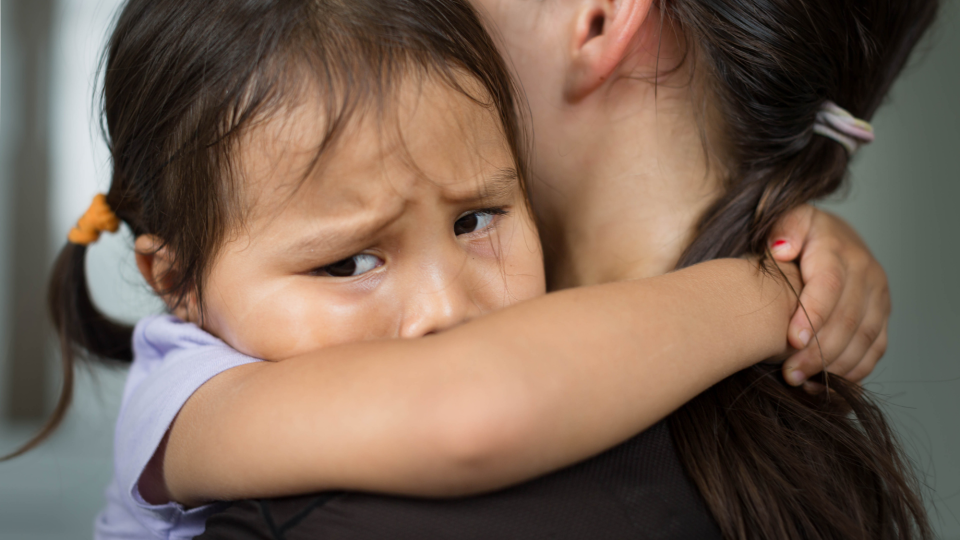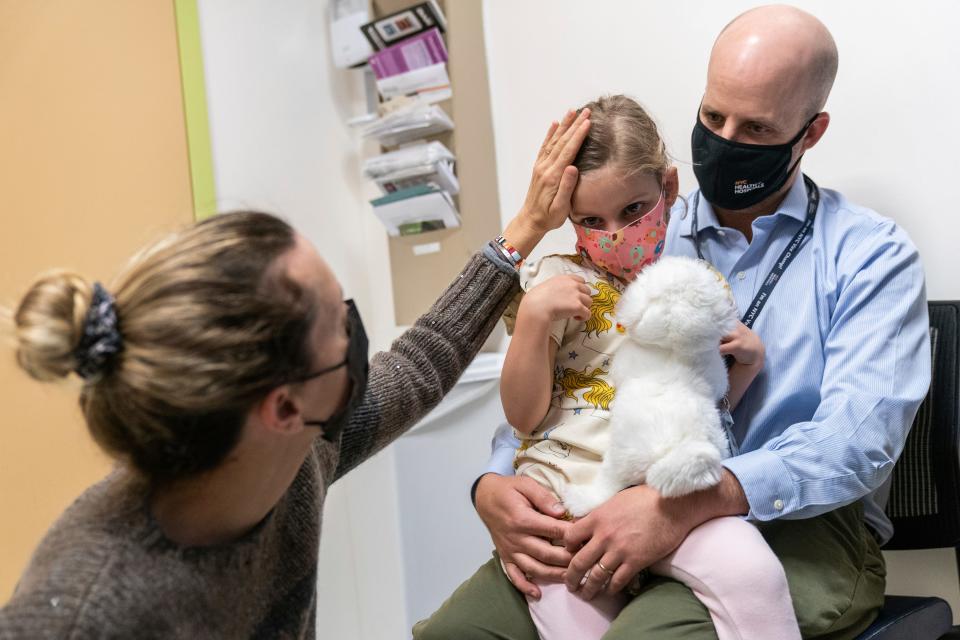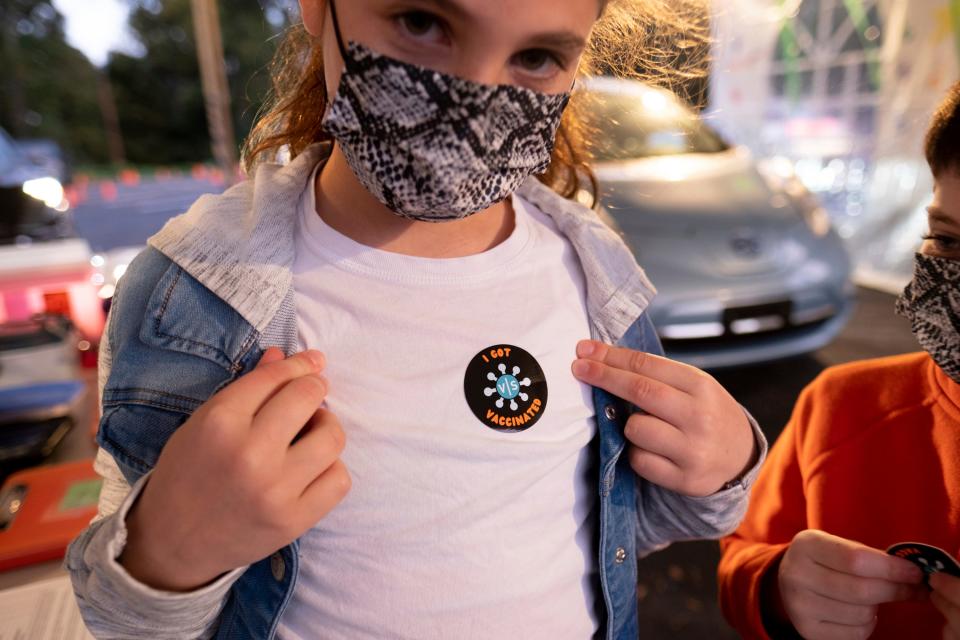9 expert tips to help your child overcome their fear of shots

— Recommendations are independently chosen by Reviewed’s editors. Purchases you make through our links may earn us a commission.
The COVID-19 vaccination has been approved for children ages 5 to 12 for nearly two weeks; in that time, nearly 1 million U.S. children have received their first dose and that number only promises to grow. If you have a child who is trotting off proudly to get their shots and posing for smiling post-vaccination photos, good for you! For the rest of us, it’s not so simple.
The fact of it is, some kids are terrified of needles and no amount of reasoning is going to get them on board without some heavy duty strategizing. Their fear is real and while we may want to encourage our children to take the “be brave” approach to getting shots, anyone who has spent any time in a pediatrician’s office knows that encouraging our kids to grin and bear it doesn’t always work.
We spoke with two anxiety experts and a pediatrician to get expert tips on helping to prepare your kids for a vaccination visit and what to do to help make needles feel a little less scary.
1. Know that needle anxiety is real

While cringing at the sight of needles is perfectly normal for many kids and adults, for others the anxiety that needles can induce can be much more pronounced. Our experts say that it’s important to recognize substantial fears and know that they may require a higher level of support. If you need to hold down your child, particularly a child in grade school, you may be looking at a developing phobia, so it’s important to approach your child’s anxiety with empathy.
Dr. Joanna Patten, pediatric psychologist at Seattle Children’s Hospital, says that negative experiences that kids may have early on can actually lead to long-term health issues.
“Childhood experiences with frightening and painful needle procedures can actually lead to avoidance of routine health care, such as vaccinations and routine blood draws in adolescence and adulthood,” she says. She recommends an empathetic, head-on approach, rather than hoping for kids to simply grow out of their fears.
In fact, recognizing that the anticipation of the pain can sometimes be more traumatic than the needles themselves can help caregivers plan and respond in a more empathetic and proactive way.
2. Be grounded

Tamar Chansky, Ph.D., founder of the Children's and Adult Center for OCD and Anxiety in Plymouth Meeting, PA says it’s important for caregivers to take a moment to recognize that they have made a decision that’s right for their family and to take a grounded approach to helping their children.
According to Chansky, parents often experience a similar anticipatory anxiety when they know they are going to face a challenging situation with their kids. She recommends doing some “behind the scenes work” to get in a grounded place, so you can better support your child and help them through their fears.
“Often when we show neutrality it can come to kids as mixed signals,” says Chansky, explaining that when a child’s big feelings take over, sometimes our empathy can come off as a wavering sense of resolve. “Take a moment to recognize that this is good parenting. Be compassionate to yourself about how hard this can be, and ground yourself before you talk to your child, so you can be supportive of your child’s anxiety.”
3. Explain the pain

This isn’t going to be their last experience with a needle. It’s important to be honest when talking to children about shots. All of the experts we spoke with say that honesty is the best policy and minimizing or sugarcoating needle pain will only cause children to lose trust in what you tell them the next time they have to have a medical procedure.
Rebecca Carter, MD, pediatrician with the University of Maryland Medical Center and Assistant Professor in Pediatrics at the University of Maryland School of Medicine, recommends explaining that, while the shot may hurt, it will likely only be for a few seconds. Chansky even recommends setting a timer for 3 to 5 seconds to show kids what a relatively short time they’ll actually experience discomfort. Both experts also recommend giving kids concrete examples of other experiences they’ve been through to help give them a reference point for what they’ll feel.
“For example, remind them of a time they fell on the playground, and reassure them that the shot will hurt far less than that. This tactic sets the stage for kids to know how worried they should be, and it takes away a lot of the unknown from the scenario,” says Carter.
4. Role play

For younger kids, role-playing can be a good lead-up to help them feel more confident and in control when their appointments occur.
“The unexpected and the unknown really play into anxiety. Role playing helps kids feel like they know what to expect,” says Chansky.
Chansky recommends going through all of the motions of receiving a shot with your child. Not only will it help mitigate their fear, it will help you troubleshoot any unanticipated anxiety triggers.
Using an alcohol wipe to clean the area and possibly an ice pack for numbing will help prepare them for added physical sensations the may not otherwise be prepared for. Chansky says you can use a doctor’s toy kit to administer the play shot, but she also likes using a ballpoint pen for a more localized sensation and to make a small mark that you can cover with a Band-Aid.
“Take turns being the doctor and being the patient. When you’re the patient it will help them feel in control and it will help them go through the experience through you, so they can be safe observers,” says Chansky. “And don’t be afraid to let them know that the ‘shot’ hurt, but that it felt better quickly.”
When you role-play you can also teach kids distraction techniques. You can give them a piece of candy to suck on, give them a book to look at and teach them how to take deep breaths to relax their muscles.
“This is basically a rehearsal where you can take them through all sorts of calming strategies to prepare for the big day,” says Chansky.
6. Go for the familiar

Lots of drug stores and pharmacies now offer flu and COVID-19 vaccinations. It may feel tempting to schedule a vaccination appointment to correspond with your weekly shopping, but if you have a child that is particularly anxious surrounding vaccinations, Carter recommends going to your pediatrician’s office.
“We do see some kids are a bit more fearful around... strangers, which makes sense after a year and a half of being cautious. This is all the more reason to help facilitate getting your shots at your pediatrician's office, which is a more familiar setting for kids and families,” says Carter.
7. Be a smart scheduler

This isn’t the time to sandwich an appointment between school and piano lessons. Our experts all say to schedule the appointment during a low-stress time.
“Nothing stokes anxiety in a child like being rushed. Give yourself enough time so that you aren’t putting your own stress and anxiety on your child, and give yourself time so that you can celebrate afterwards,” says Chansky, adding that a post-vaccination ice cream may be just the motivator your child needs to feel brave.
8. Come with reinforcements

Remember, needle anxiety is incredibly common. This means there are lots of tools and strategies available that can help calm your child. Chansky is a fan of the Buzzy vibrating ice pack (available at Amazon for $49.95). The ice pack helps numb the area while the vibration of the device helps relax the muscles and distract the patient. LMX 4 is a non-prescription topical anesthetic (available at Amazon for $29.22) that can also help.
Patten also recommends communicating with your child’s medical provider to explain your child’s anxiety and to investigate what strategies they offer for helping with pain, including prescription of numbing cream for the skin, and in-house strategies for mitigating anxiety. She recommends talking out a clear plan well before your visit, so that you can tell your child what to expect. When they arrive, encourage them to let their healthcare provider know what they are expecting and what they need to feel comfortable with the procedure.
“Some children enjoy the opportunity to advocate for themselves and their coping and pain management preferences,” says Patten.
9. Celebrate

Take them out, take photos, give them a gold star.
Chansky says that simply getting through, tears or not, is something to celebrate. Even if the appointment didn’t go as smoothly as planned, celebrating that they got through it is an important ritual to help prepare them the next time around.
“Show them how proud you are and don’t be shy about letting them know that they did a really good thing for the community by keeping themselves safe and helping to keep others safe,” says Chansky.
The product experts at Reviewed have all your shopping needs covered. Follow Reviewed on Facebook, Twitter, Instagram, TikTok or Flipboard for the latest deals, product reviews and more.
Prices were accurate at the time this article was published but may change over time.
This article originally appeared on Reviewed: 9 expert tips to calm a child that's afraid of shots

